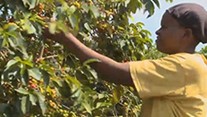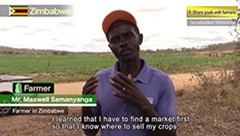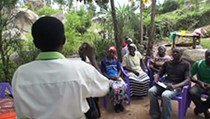From “Grow and sell” to “Grow to sell” agriculture.

The SHEP approach not only helps improve incomes but also helps farmers feel a sense of fulfillment through agriculture.
The SHEP approach is an agricultural extension method to transform farmers’ mindset from “Grow and sell” to “Grow to sell”.
In countries where the SHEP approach has been introduced, the result was that nearly all farmers not only have made significant improvements in their incomes but also felt a sense of fulfillment in agriculture.
At the Seventh Tokyo International Conference on African Development (TICAD VII) held in 2019, a "declaration for achieving better lives of one million small-scale farmers through SHEP Approach" was made. In order to achieve this by 2030, the SHEP approach for agricultural extension services collaborating with various organizations, such as donor partners and NGOs, has been accelerated. Since SHEP implementers are trained mainly through Group and Region-Focused Training, we created JICA-Net multimedia-based learning material, “The SHEP Approach Training: Practice” (YouTube, external link), to continue the training remotely since the COVID-19 pandemic.
Introduce concrete dissemination activities of the SHEP approach
Although some materials about the SHEP approach were created in the past, this material especially focuses on the actual activities of the SHEP approach. Its content deeply and practically explains 4 steps (1. Share goals with farmers, 2. Farmers' awareness is raised, 3. Farmers make decisions, 4. Farmers acquire skills) to apply the SHEP approach, along with interviews with farmers and extension staff in countries and regions where the SHEP approach has been introduced, and many videos from the field.

The material explains the SHEP approach. along with interviews with farmers and extension staff in countries and regions where it has been introduced, and many videos from the field.
Because the material is an audio-visual material, there is the advantage that people can understand more exactly and rapidly than a simple verbal explanation.
Moreover, by showing success examples to farmers and extension staff, they can have a reference and this increases their motivation.
Utilize the material in various scenes such as training programs, local projects, and lectures in universities
The material aims at government officials and extension staff in developing countries, SHEP implementers and farm management leaders in international organizations, private companies and other partner organizations such as NGOs, as well as Japanese students and the general public. We have already used it for Group and Region-Focused Training (including online programs) for Asia, Africa, Central and South America, and Middle East countries, training programs conducted in projects of JICA Technical Cooperation and international workshops.
We changed the way of learning in a face-to-face class by using the material. Specifically, the key points of the training program are conveyed to the trainees by viewing the material before we visit the actual site and have a question-and-answer session. Because of this, we can perform the program efficiently.
Moreover, it is very useful for not only Group and Region-Focused Training but also remote programs and site projects.
It is also helpful as a material for every kind of lecture. Actually, there is an example of incorporating SHEP into modules in practical agricultural extension courses at universities. We expect that the material could be used even in such classes in the future.
By watching JICA-Net multimedia-based learning material, “The SHEP Approach Training Digest” (YouTube, external link), together, which was created in FY2020, viewers can get more detailed information in advance.
Expand the SHEP approach to one million small-scale farmers

JICA plans to train 70,000 SHEP trainers who deeply understand the SHEP approach and practice it for farmers.
JICA together with various partners has the goal of expanding the agricultural extension service that uses the SHEP approach to one million farmers by 2030. For its achievement, JICA plans to train 70,000 SHEP trainers who deeply understand the SHEP approach and practice it for farmers.
We hope that government officials in every country, extension staff, Japan Overseas Cooperation Volunteers, NGOs, development partners and the general public will view the material and use it for the SHEP programs around the world, as a previous self-learning material for Group and Region-Focused Training and as a material for every government organization, donor and private company who are considering to apply the SHEP approach to learn the basic conceptof the SHEP approach and to train SHEP experts, including Japanese.
A related page
YAMAZAKI Dan
Team 3, Agricultural and Rural Development Group 1
JICA Economic Development Department
*The Material(s) mainly applied
The SHEP Approach Training: Practice
The SHEP approach that successfully transforms farmers’ mindsets from “grow and sell” to “grow to sell” was developed based on numerous insights acquired from agricultural extension in Japan. This material introduces the voices of farmers and extension officers who are actually implementing the SHEP approach in their countries.
At the Seventh Tokyo International Conference on African Development (TICAD VII) held in 2019, "declaration for achieving better lives of one million small scale farmers through SHEP Approach" was made. In order to achieve this by 2030, the SHEP approach for agricultural extension services collaborations with various organizations, such as donor partners and NGOs, have been accelerated. Since SHEP implementers are trained mainly through Group and Region-Focused Training, this material was created to promote the training remotely without face-to-face lectures by conveying the key points of the training in this material. It is recommended to watch this “practice version” together with another video titled "The SHEP Approach Training Digest" made in 2020 to deepen further understanding of the SHEP approach.




scroll